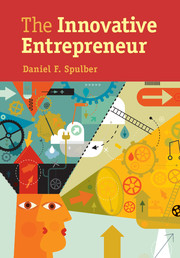Book contents
- Frontmatter
- Contents
- Preface
- Acknowledgments
- 1 Introduction
- 2 Entrepreneurial Motivation
- 3 Innovative Advantage
- 4 Competitive Pressures and Entrepreneurial Incentives to Innovate
- 5 Creative Destruction
- 6 Creative Destruction
- 7 Creative Destruction
- 8 Creative Destruction
- 9 The Wealth of Nations
- 10 Conclusion
- Bibliography
- Index
8 - Creative Destruction
Asymmetric Information
Published online by Cambridge University Press: 05 July 2014
- Frontmatter
- Contents
- Preface
- Acknowledgments
- 1 Introduction
- 2 Entrepreneurial Motivation
- 3 Innovative Advantage
- 4 Competitive Pressures and Entrepreneurial Incentives to Innovate
- 5 Creative Destruction
- 6 Creative Destruction
- 7 Creative Destruction
- 8 Creative Destruction
- 9 The Wealth of Nations
- 10 Conclusion
- Bibliography
- Index
Summary
Asymmetric information in the market for inventions can make entrepreneurship more likely to occur. Contracting between an inventor and an existing firm to transfer an invention is thus subject to problems arising from information asymmetries. Even if an invention is codified and easily communicated, the inventor is likely to know much more about its features than potential adopters. When features of inventions are not perfectly observable, there may be adverse selection in the market for inventions. The inventor may choose to become an entrepreneur and establish a firm to implement the invention as a means of overcoming adverse selection problems. This chapter considers incentives for technology transfer and entrepreneurship when inventors have private information about their invention.
For Arrow (1962b, p. 150) invention is the production of information, and rents fall when “information becomes a commodity.” He observes that “[a]n entrepreneur will automatically acquire a knowledge of demand and production conditions in his field which is available to others only with special effort.” He further points out that the transmission of knowledge is imperfect because of costly communication and errors in judgment.
Zeckhauser (1996) argues that markets form institutions to address problems in transferring technological information (TI): “Webs of relationships, formal and informal, involving universities, start-up firms, corporate giants, and venture capitalists play a major role in facilitating the production and spread of TI.” To address asymmetric information problems, inventors and adopters form long-term contracts, partnerships, and joint ventures, which further raise the costs of knowledge transfers.
- Type
- Chapter
- Information
- The Innovative Entrepreneur , pp. 246 - 269Publisher: Cambridge University PressPrint publication year: 2014



